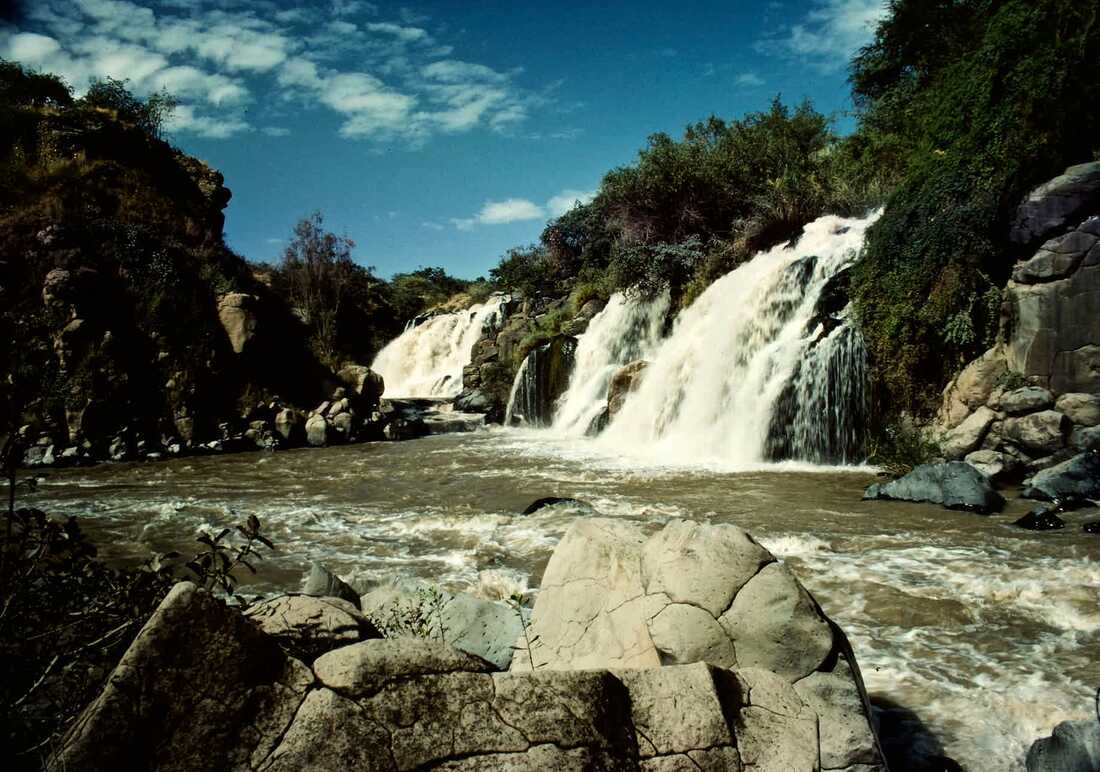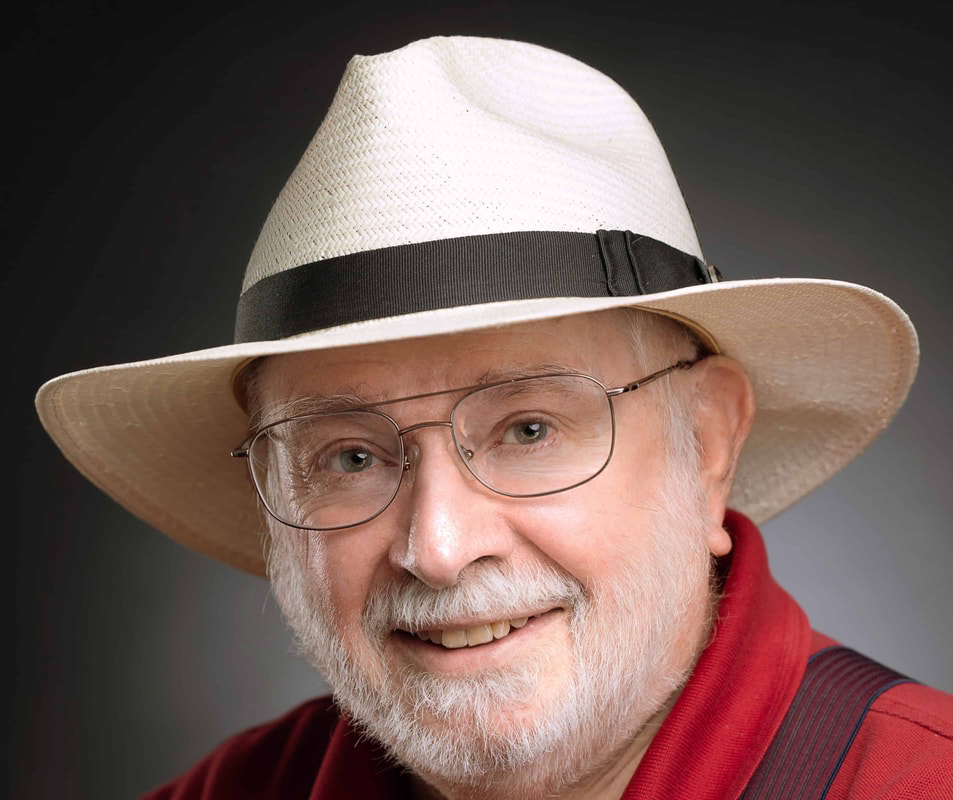|
Excerpt from my story, "Land of Troubles," in From The Potato to Star Trek and Beyond September 1976, Heathrow Airport, London: A pair of five fingered spiders skittered lightly up and down my body, quickly probing every crevice, searching for contraband. Briefly, delicately, the fingers traced the outline of the Swiss Army Knife nestled in my pocket. This guy was a pro, quite unlike the clumsy TSA searchers of today. He knew about the knife, but I didn't fit the profile. I passed inspection and proceeded through the boarding gate. I was on my way to Ethiopia and an expedition down the wild and still unexplored Omo River. My friend had warned me. Don't do this. It's far more dangerous than you can possibly imagine. I didn't listen. He was right. The flight from London to Addis Abba was long delayed. At last it was time for my bags to be examined. Every single item was removed, unraveled and looked at closely, then remarkably, precisely repacked. I went through the body inspection and was allowed to board. The passenger cabin of the airliner was near empty on the long flight. All but one of the few passengers were fellow members of our expedition. The outsider proved to be the president of Ethiopian Airlines. During a friendly conversation he mentioned the long delay resulted from a warning — a bomb had been placed aboard. We refueled in Rome and headed out over the Mediterranean. After a long and restless night, dawn found me gazing down at Khartoum spread along the pointed tongue between the merging streams of the Blue and White Nile. We flew on. The next day I opened my journal and began to write. What follows is based on those journal entries. The plane began its sag towards the high plateau of the central Ethiopian massif. It was clear from the outset Addis Ababa was a different city from most I had seen. On flights into many cities around the U.S. and, on this trip, into London and Rome, I had observed each is certainly different in its own way. But they are all variations on a pattern — a western pattern. Addis was a completely unfamiliar world. On the approach to the metropolis, small farms, scattered about the landscape, broke up the countryside into unlikely patches. The farm buildings themselves were small and densely clustered, making compounds which were surprisingly large. Each farm center appeared to be a small village. But these villages were not laid out along streets and blocks. The pattern of the cluster was rectangular but the buildings were irregularly spaced. There was no edge to the city proper. Farms became smaller and closer together as we approached the airport until they fused together. Fields diminished in size, gradually becoming backyards. Occasionally a large structure would appear — almost invariably in these outskirts this would emerge as the gleaming golden dome of a church whose architecture was a legacy from the Age of Justinian. Eventually we were on the final approach to the mile high capital city. And finally, we were down. The long walk across the runway apron from the plane to the small terminal building gave plenty of time to soak in the atmosphere. The air of the high mountain plateau was crisp and a gentle breeze carried aromas of a subtle alien quality. The land was verdant with the growth of the rainy season. The margins of the runway held back charging legions of golden blossomed bushes. I was reminded of California Mustard in the spring. But spring and California were two seasons and half a world away. Here it was Meskel, the holy day of the true cross, in the season of the yellow flowers, and of rain. Things became unpleasant in the terminal. The few of us who were from the plane jammed into a line that had piled up long before. One of my companions for this expedition, Kathy, was plucked from the milling confusion by a matron and hustled into a tiny cubical to be strip searched. She was seething on her return. My problems came later. I collected my baggage from the cart and hauled it over to the custom inspector's table. The official, in a slightly disheveled uniform, poked around in the innards of my pack and suitcase without much enthusiasm. Turning his attention to the tightly sealed carton I had carried from California, he asked me to open it for inspection in fractured English. No way! That box had factory packed tents. Once opened it would be impossible to put everything back together. The inspector got stubborn. I changed my tack. Okay, I would let the inspector open the box, but he was going to have to repack it. I assured him this was going to take several hours. The message got across, and rather glumly the bureaucrat passed me through, box undisturbed. I discovered how narrowly I’d escaped real trouble later. The new "Socialist" government had, a few days before, ordered all the currency of the country be turned in and replaced with a new issue. Of course the new money would be worth less than the old, with higher denominations redeemed at a lower rate of exchange. Soak the rich, as usual. Since the new government had declared it, ex post facto, to be illegal to take money out of the country they were searching travelers for money being smuggled back in. This was the critical day because the deadline for turning in the old currency was on the morrow. No wonder a sealed carton of the right size attracted so much attention. Outside the terminal the straggling survivors of the customs inquisition were gradually collected by a tall, bronzed, boatman type. He introduced himself as John Yost and said he would be one of the guides on the trip. The trip leader, Jim Slade, was on his way from the city and would pick us up in a few minutes. Sure enough, Slade cruised in, driving a battered old car and leading a squadron of colorful taxi cabs. We sorted ourselves out and I found myself seated next to Slade for the drive to the city. We approached Addis Ababa — the Little Flower — along a broad boulevard. Scattered at random along its margins were buildings of an amazing variety of architectural styles. Italian Baroque dominated — the legacy of Italy's long, sometimes unfriendly, association with the country. Otherwise there was no obvious organizing principle. The pavilions were plunked down wherever a patron's fancy chose. Orientations of the various structures were also random. One was as likely to see a back porch as a front door. Many of the structures were large and elegant. Jim said much of the Capital's diplomatic community was housed along this highway. Presently we passed a low cluster of solid but unkempt structures. To one side was a tall flag pole. As we drew abreast a gust of wind ruffled the limp rag at the top and it briefly snapped to attention. Its insignia was a dark gray ball on tattered gray background. The frayed edges of the cloth were like decorative ribbons, signifying ages of dutiful service. It was the embassy of Japan, literally at the end of the world for the poor, devoted folk within. A few miles further and the scattered structures thickened into city. Traffic picked up. It was time for the game. Photo of Awash Falls by Chester L. Richards. Photo and story excerpt copyright @ 2022 Chester L. Richards. Full story, including scene of gun pointed at Chet's belly in From The Potato to Star Trek and Beyond: Memoirs of a Rocket Scientist
0 Comments
Leave a Reply. |
From Chester L. Richards
Hello, and happy to see you here! A little about what's behind these stories: Having retired from the world of aerospace engineering, I now spend time reading, inventing, listening to music, taking photographs and sharing them with friends. And writing stories. Often about people I've met as I've traveled to exotic places, learned about music, surfing, white water rafting, optics, photography. Every story is true. I hope you enjoy them. Archives
June 2024
Categories
All
|


 RSS Feed
RSS Feed





